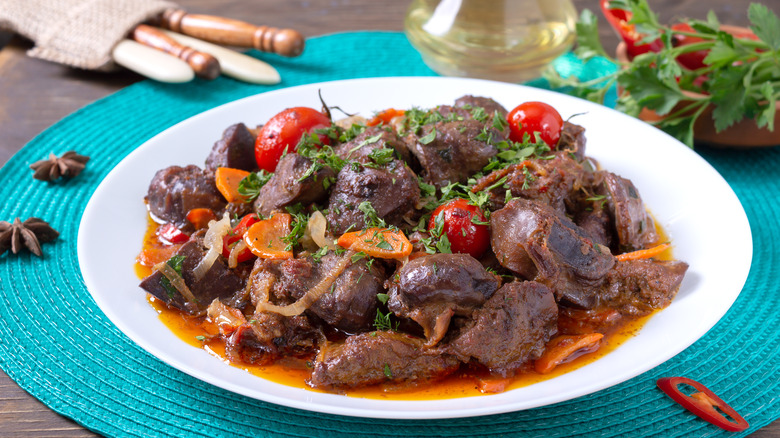Surprising Health Benefits Of Eating Organ Meats
Have you ever tried chicken liver pie, tripe soup, or crispy sweetbreads? These dishes may not be super popular, but they pack a hefty nutritional punch. For example, chicken liver boasts a whopping 24 grams of protein and only 167 calories per 3.5 ounces, reports Nutritionx. You'll also get 267% of the recommended daily amount of vitamin A and 47% of the recommended daily vitamin C intake. Tripe soup, a common dish in the Balkans and Eastern Europe, has around 150 calories, 17 grams of protein, 8 grams of carbs, and 5.2 grams of fat per serving, according to Nutrition Value. Plus, it's a good source of iron, calcium, choline, selenium, zinc, and vitamin B12.
Such dishes are made with organ meats, or offal, including liver, tripe, spleen, bones, kidneys, and other animal tissues. Their consumption is considered taboo in some cultures, but you might still want to give them a try. These foods are chock-full of protein and trace minerals, with relatively small amounts of fat, notes a 2019 review presented in the journal, Animals. What's more, they're relatively inexpensive and easy to cook. Kidneys, for instance, contain up to 20 grams of protein per serving and make a great addition to casseroles, pies, or sautéed dishes, says Men's Journal.
Believe it or not, organ meats have some surprising health benefits. After all, there's a reason why they're a staple in the Paleo diet. Just like with everything else, however, it's important to consume them in moderation.
The real reason you should eat organ meats more often
Organuary, a public initiative launched in the UK, encourages consumers to eat organ meat as a way to reduce food waste and get more nutrition. As Healthline notes, these foods are rich in iron, zinc, magnesium, and B-complex vitamins. Protein, one of the most abundant nutrients in offal, increases satiety and helps preserve lean mass. Choline, a vitamin-like compound, plays a key role in brain health and lipid metabolism, explains the National Institutes of Health.
Organ meats also contain large amounts of selenium, a mineral that fights oxidative stress and keeps your hormones in balance. Selenium-rich diets may lower cancer risk by more than one-third and protect against thyroid disease, according to the Harvard T.H. Chan School of Public Health. Moreover, this nutrient supports cardiovascular function and may help prevent DNA damage. Vitamin A, a fat-soluble nutrient in animal liver and other organs, promotes eye and skin health, says the U.S. National Library of Medicine.
While it's true that most organ meats pack a lot of cholesterol, this nutrient has negligible effects on blood cholesterol levels, explains Healthline. Offal is generally safe, but you should consume it in moderation if you're pregnant. Vitamin A, one of the main nutrients in organ meats, can lead to birth defects when consumed in excess. These foods are also high in purines and may trigger gout flare-ups. Apart from that, there's no reason to avoid organ meats unless you're a vegan or vegetarian.


